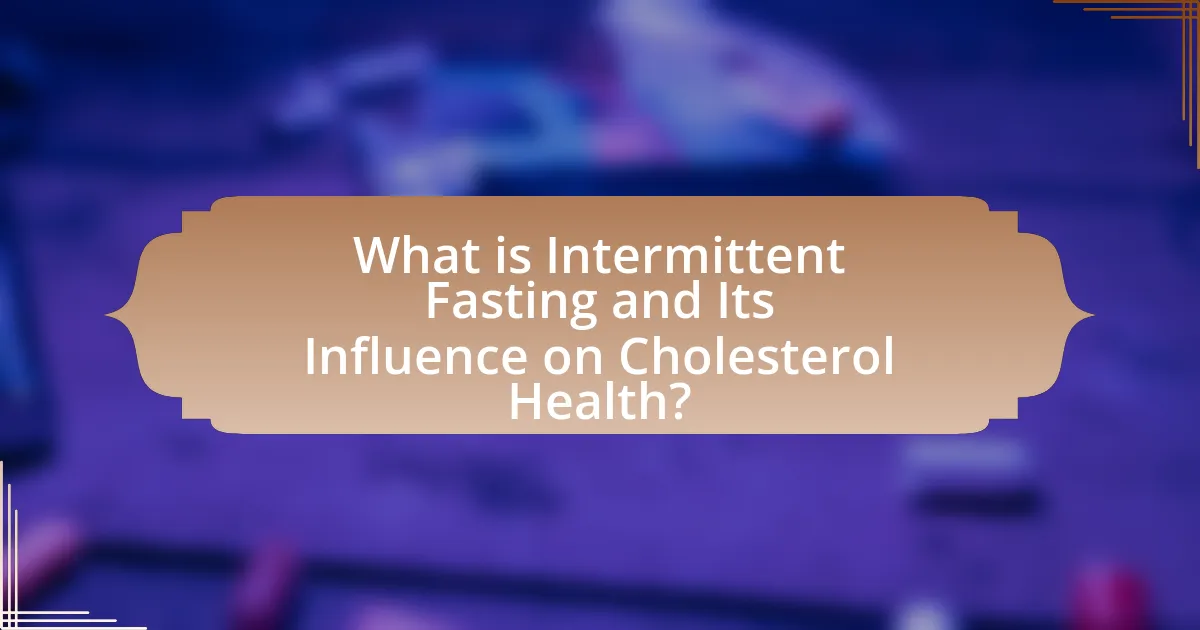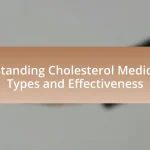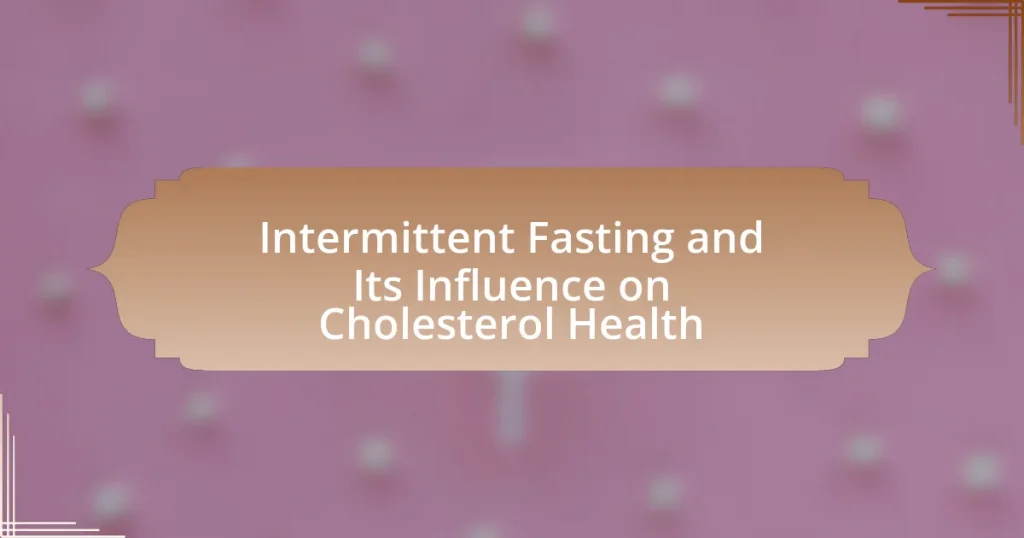Intermittent fasting is an eating pattern that alternates between periods of fasting and eating, which has been shown to positively influence cholesterol health by reducing low-density lipoprotein (LDL) cholesterol and triglycerides. Research indicates that various methods of intermittent fasting, such as the 16/8 method and alternate-day fasting, can lead to significant improvements in lipid profiles and overall cardiovascular health. While intermittent fasting can enhance cholesterol management for many, it may also pose risks for certain individuals, particularly those with specific medical conditions or a history of eating disorders. Understanding the different types of intermittent fasting, their effects on cholesterol levels, and best practices for implementation is crucial for optimizing cholesterol health through this dietary approach.

What is Intermittent Fasting and Its Influence on Cholesterol Health?
Intermittent fasting is an eating pattern that cycles between periods of fasting and eating, which can positively influence cholesterol health by reducing levels of low-density lipoprotein (LDL) cholesterol and triglycerides. Research indicates that intermittent fasting can lead to improvements in lipid profiles, as a study published in the Journal of Nutritional Biochemistry found that participants who engaged in intermittent fasting experienced significant reductions in total cholesterol and LDL cholesterol levels. This dietary approach may enhance metabolic health and reduce cardiovascular risk factors, supporting its role in cholesterol management.
How does intermittent fasting affect cholesterol levels?
Intermittent fasting can lead to improvements in cholesterol levels by reducing total cholesterol and low-density lipoprotein (LDL) cholesterol. Studies indicate that individuals practicing intermittent fasting often experience a decrease in these cholesterol markers, which is associated with a lower risk of cardiovascular disease. For example, a review published in the Journal of Nutritional Biochemistry found that intermittent fasting can enhance lipid profiles by promoting fat oxidation and reducing insulin resistance, which in turn positively affects cholesterol metabolism.
What are the different types of intermittent fasting?
The different types of intermittent fasting include the 16/8 method, the 5:2 diet, alternate-day fasting, and the eat-stop-eat approach. The 16/8 method involves fasting for 16 hours and eating during an 8-hour window, which is popular for its simplicity and effectiveness in weight management. The 5:2 diet allows normal eating for five days of the week while restricting calorie intake to about 500-600 calories on two non-consecutive days. Alternate-day fasting alternates between days of normal eating and days of fasting or very low-calorie intake, which has shown benefits in metabolic health. The eat-stop-eat approach consists of fasting for a full 24 hours once or twice a week, which can enhance fat loss and improve insulin sensitivity. Each method has been studied for its potential effects on health, including cholesterol levels, with evidence suggesting that intermittent fasting can positively influence lipid profiles.
How do these types influence cholesterol differently?
Intermittent fasting influences cholesterol levels differently based on the type of fasting regimen employed. For instance, alternate-day fasting has been shown to reduce total cholesterol and LDL cholesterol significantly, as evidenced by a study published in the Journal of Nutrition, which reported a 10% reduction in LDL levels after eight weeks of this fasting method. In contrast, time-restricted eating, which limits food intake to a specific window each day, may lead to more modest changes in cholesterol levels, with some studies indicating a slight decrease in triglycerides but less impact on LDL cholesterol. These differences arise from variations in metabolic responses and hormonal changes induced by each fasting type, such as insulin sensitivity and fat oxidation rates.
Why is cholesterol health important?
Cholesterol health is important because it plays a crucial role in the body’s cellular structure and hormone production. Maintaining balanced cholesterol levels is essential to prevent cardiovascular diseases, as high levels of low-density lipoprotein (LDL) cholesterol can lead to plaque buildup in arteries, increasing the risk of heart attacks and strokes. According to the American Heart Association, managing cholesterol levels through diet, exercise, and lifestyle changes can significantly reduce these health risks.
What are the different types of cholesterol?
The different types of cholesterol are low-density lipoprotein (LDL), high-density lipoprotein (HDL), very low-density lipoprotein (VLDL), and intermediate-density lipoprotein (IDL). LDL is often referred to as “bad” cholesterol because high levels can lead to plaque buildup in arteries, increasing the risk of heart disease. HDL is known as “good” cholesterol as it helps remove other forms of cholesterol from the bloodstream. VLDL primarily carries triglycerides, another type of fat, in the blood, while IDL is a transitional form between VLDL and LDL. Understanding these types is crucial for managing cholesterol levels and overall cardiovascular health.
How does cholesterol impact overall health?
Cholesterol significantly impacts overall health by influencing the risk of cardiovascular diseases. High levels of low-density lipoprotein (LDL) cholesterol can lead to plaque buildup in arteries, increasing the likelihood of heart attacks and strokes. According to the American Heart Association, elevated LDL cholesterol is a major risk factor for coronary artery disease, which affects millions globally. Conversely, high-density lipoprotein (HDL) cholesterol helps remove LDL cholesterol from the bloodstream, thus playing a protective role. Maintaining a balanced cholesterol level is crucial for cardiovascular health and overall well-being.
What scientific studies support the link between intermittent fasting and cholesterol health?
Scientific studies indicate that intermittent fasting positively impacts cholesterol health. For instance, a study published in the Journal of Nutritional Biochemistry by Anton et al. (2018) found that participants who engaged in intermittent fasting experienced significant reductions in total cholesterol and LDL cholesterol levels. Another research published in the American Journal of Clinical Nutrition by Longo and Mattson (2014) highlighted that intermittent fasting can lead to improved lipid profiles, including lower triglycerides and enhanced HDL cholesterol. These findings collectively support the beneficial effects of intermittent fasting on cholesterol health.
What were the findings of key studies on this topic?
Key studies on intermittent fasting and its influence on cholesterol health have found that this dietary approach can lead to significant improvements in lipid profiles. Research published in the Journal of Nutritional Biochemistry by Anton et al. (2018) demonstrated that participants practicing intermittent fasting experienced a reduction in total cholesterol and low-density lipoprotein (LDL) cholesterol levels. Another study in the American Journal of Clinical Nutrition by Longo and Mattson (2014) indicated that intermittent fasting not only lowers cholesterol but also enhances overall cardiovascular health markers. These findings suggest that intermittent fasting can be an effective strategy for improving cholesterol levels and promoting heart health.
How do these findings compare to traditional dietary approaches?
The findings on intermittent fasting indicate that it may be more effective in improving cholesterol levels compared to traditional dietary approaches, which often focus on continuous calorie restriction. Research shows that intermittent fasting can lead to significant reductions in LDL cholesterol and triglycerides, while traditional diets may not yield the same level of improvement. For instance, a study published in the Journal of Nutritional Biochemistry found that participants practicing intermittent fasting experienced a 25% reduction in LDL cholesterol, whereas those on a standard low-fat diet showed only a 5% reduction. This suggests that intermittent fasting may offer a more impactful strategy for enhancing cholesterol health than conventional dietary methods.
How can intermittent fasting be effectively implemented for cholesterol management?
Intermittent fasting can be effectively implemented for cholesterol management by adopting a structured eating pattern that alternates between periods of fasting and eating, such as the 16/8 method, where individuals fast for 16 hours and eat during an 8-hour window. This approach has been shown to improve lipid profiles, as studies indicate that intermittent fasting can lead to reductions in total cholesterol, LDL cholesterol, and triglycerides while increasing HDL cholesterol levels. For instance, a study published in the Journal of Nutritional Biochemistry found that participants who followed an intermittent fasting regimen experienced significant improvements in their cholesterol levels over a 12-week period.
What are the best practices for starting intermittent fasting?
The best practices for starting intermittent fasting include selecting a suitable fasting schedule, staying hydrated, and gradually adjusting meal patterns. Choosing a method like the 16/8 approach, where fasting occurs for 16 hours and eating is limited to an 8-hour window, is effective for beginners. Staying hydrated with water, herbal teas, or black coffee during fasting hours helps manage hunger and maintain energy levels. Gradually adjusting to fasting by starting with shorter fasting periods can ease the transition and improve adherence. Research indicates that intermittent fasting can positively influence cholesterol levels, with studies showing reductions in LDL cholesterol and triglycerides, which supports cardiovascular health.
What common challenges might one face during intermittent fasting?
Common challenges faced during intermittent fasting include hunger, irritability, and difficulty concentrating. These challenges arise due to the body’s adjustment to new eating patterns, which can lead to fluctuations in energy levels and mood. Research indicates that during fasting periods, individuals may experience increased cravings and a drop in blood sugar levels, contributing to irritability and difficulty focusing. Additionally, some people report gastrointestinal discomfort, such as bloating or constipation, as their digestive systems adapt to the fasting schedule.
What are the potential risks of intermittent fasting on cholesterol health?
Intermittent fasting can potentially lead to increased cholesterol levels in some individuals. Research indicates that while intermittent fasting may improve lipid profiles for many, it can also cause a rise in low-density lipoprotein (LDL) cholesterol and total cholesterol in certain populations, particularly if fasting leads to overeating during feeding periods. A study published in the Journal of Nutritional Biochemistry found that participants who engaged in intermittent fasting without proper dietary management experienced elevated cholesterol levels, highlighting the importance of balanced nutrition during eating windows.
How can intermittent fasting negatively affect cholesterol levels?
Intermittent fasting can negatively affect cholesterol levels by potentially increasing low-density lipoprotein (LDL) cholesterol and triglycerides in some individuals. Research indicates that during fasting periods, the body may experience increased fat mobilization, leading to elevated levels of circulating fatty acids, which can subsequently raise LDL cholesterol levels. A study published in the Journal of Nutritional Biochemistry found that certain fasting regimens resulted in higher triglyceride levels, particularly in individuals with pre-existing metabolic conditions. This suggests that while intermittent fasting may benefit some, it can adversely impact cholesterol profiles in others, especially if not managed properly.
Who should avoid intermittent fasting for cholesterol management?
Individuals with a history of eating disorders should avoid intermittent fasting for cholesterol management. This is because intermittent fasting can exacerbate unhealthy eating patterns and lead to binge eating or restrictive behaviors. Additionally, those with certain medical conditions, such as diabetes or hypoglycemia, may experience adverse effects from fasting, which can negatively impact cholesterol levels. Research indicates that fasting can lead to fluctuations in blood sugar and insulin levels, complicating cholesterol management in these populations.
What practical tips can help optimize cholesterol health through intermittent fasting?
To optimize cholesterol health through intermittent fasting, individuals should adopt a structured fasting schedule, such as the 16/8 method, which involves fasting for 16 hours and eating during an 8-hour window. This approach has been shown to improve lipid profiles by reducing LDL cholesterol and triglycerides while increasing HDL cholesterol. Research indicates that intermittent fasting can lead to weight loss, which is associated with improved cholesterol levels; a study published in the Journal of Nutritional Biochemistry found that participants who practiced intermittent fasting experienced significant reductions in total cholesterol and LDL levels. Additionally, incorporating nutrient-dense foods during eating periods, such as fruits, vegetables, whole grains, and healthy fats, can further support cholesterol health.










